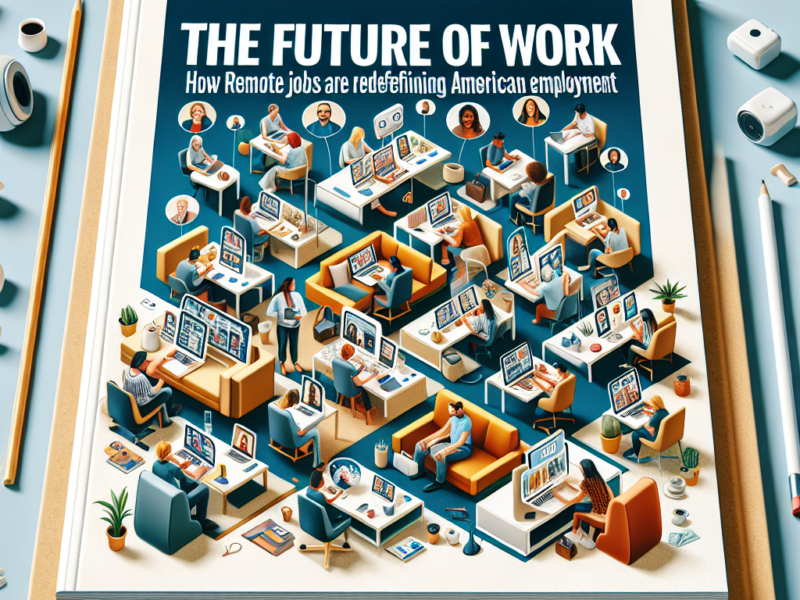In recent years, the landscape of American employment has undergone a seismic shift, catalyzed by technological advancements and global events such as the COVID-19 pandemic. Remote work has evolved from a temporary solution into a long-lasting trend that is redefining traditional employment models. As more companies embrace flexible work arrangements, the future of work seems poised to offer unprecedented opportunities and challenges for both employers and employees.
The Rise of Remote Work
The notion of remote work is not new, but its adoption has accelerated dramatically since 2020. According to a report from Stanford University, approximately 42% of the American workforce was working remotely full-time during the pandemic. This trend has persisted, with many organizations choosing to adopt hybrid models that blend in-office and remote working arrangements.
Technological advancements have facilitated this transition by providing tools that enable seamless communication, collaboration, and project management. Platforms like Zoom, Slack, and Asana have become ubiquitous in the professional sphere, allowing teams to connect and work together regardless of geographical location.
Employee Benefits and Expectations
While remote work offers employers flexibility in managing their workforce, it also brings significant benefits to employees. Many workers relish the opportunity to avoid lengthy commutes, achieve better work-life balance, and create personalized work environments. A survey by FlexJobs revealed that 73% of respondents cited work-life balance as the most important factor in job satisfaction.
Moreover, remote work has opened doors for individuals who may have been sidelined in the traditional workplace. This includes caregivers, people with disabilities, and those living in rural areas where job opportunities are limited. By breaking down geographical barriers, remote jobs provide a platform for a richer diversity of talent, promoting inclusivity and innovation.
The New Corporate Culture
With the shift to remote work, corporate culture has also experienced substantial changes. Companies are increasingly focusing on results rather than hours worked, fostering a culture of trust and accountability. This has led to the emergence of new management practices, such as asynchronous communication, where teams operate on different schedules while still collaborating effectively.
However, the transition is not without its challenges. Building relationships and maintaining a cohesive company culture in a remote environment requires intentional effort. Organizations are now investing in virtual team-building activities, mental health resources, and regular check-ins to sustain employee engagement and morale.
The Job Market Transformation
As remote work becomes more entrenched in American employment culture, the job market is evolving in significant ways. Remote positions are attracting a wider talent pool, allowing employers to tap into skills and expertise that may not have been accessible in their immediate vicinity. This shift has led to intense competition for remote jobs, with applicants no longer limited by geography.
This transformation has also prompted a re-evaluation of salary structures. Employers are grappling with whether to standardize wages based on location or offer a uniform salary across the board. As remote opportunities become more commonplace, candidates are increasingly prioritizing flexibility and work arrangements over traditional benefits, prompting companies to rethink their compensation strategies.
The Future of Leadership
The transition to remote work necessitates a redefinition of leadership styles. Leaders must become adept at managing remote teams, which requires effective communication, empathy, and adaptability. Traditional top-down approaches are being replaced by more collaborative and inclusive management styles, fostering a sense of belonging among remote employees.
As organizations seek to cultivate a remote-friendly culture, leadership training programs are evolving to equip managers with the skills necessary to thrive in this new environment. The emphasis is shifting toward outcomes and fostering psychological safety, enabling teams to innovate and perform at their best regardless of where they are located.
Conclusion: Embracing the New Normal
The future of work in America is unmistakably tied to the rise of remote employment. As companies navigate this new landscape, both employees and employers must adapt to reap the benefits of flexibility, diversity, and innovation. The ongoing evolution of remote work will continue to redefine how we approach employment, with lasting implications for job satisfaction, corporate culture, and the global economy.
In this brave new world, the ability to embrace change will be crucial. Organizations that recognize the potential of remote work and actively cultivate a flexible, supportive environment will undoubtedly find themselves at the forefront of the future of work. Embracing this transformation isn’t just a trend; it’s an opportunity to reimagine how we work, live, and collaborate in a rapidly changing world.











